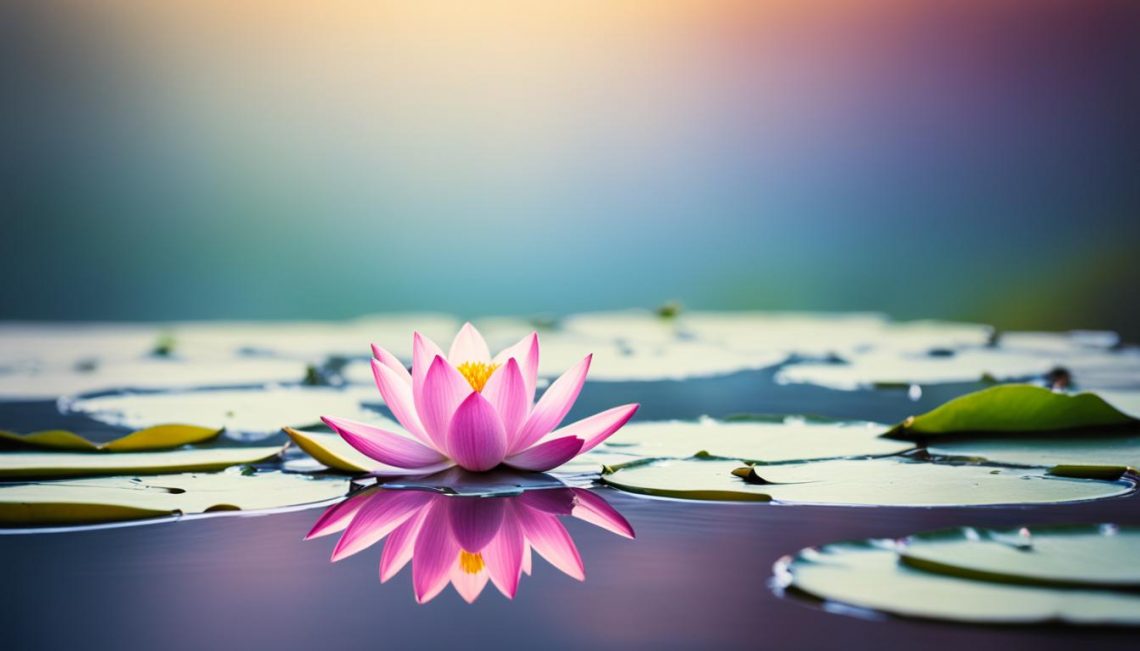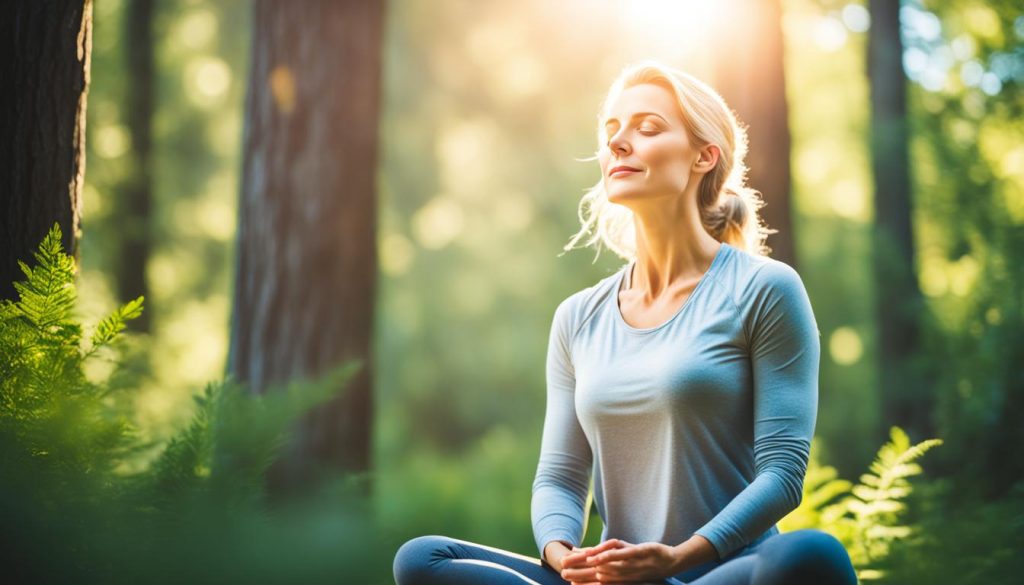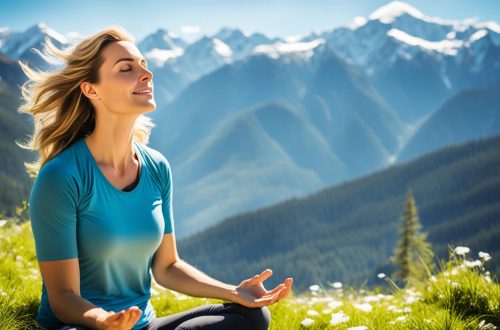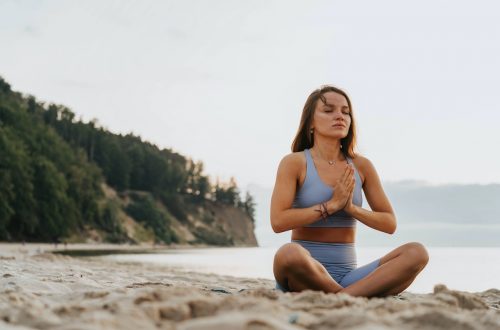
Mindfulness for Anxiety: Simple Practice Guide
About 40 million adults in the United States deal with anxiety disorders. This fact shows how common anxiety is and its significant impact on people’s lives.
Mindfulness offers a way to lessen anxiety and bring about peace and clear thinking. It helps people pay more attention to now. It also helps control thoughts and feelings better, lowering anxiety.
This article will show you how mindfulness can ease anxiety. Whether you’re just starting or want to improve your mindfulness, we will guide you. Let’s explore how mindfulness changes lives for the better.
Understanding Mindfulness and Its Benefits
Mindfulness is a powerful way to help those struggling with anxiety. But what is it, exactly? How does it help?
Mindfulness means paying attention on purpose, in the present, without judging. It’s about noticing our thoughts, feelings, and physical sensations. By doing this, we better understand ourselves and our experiences.
So, how does mindfulness aid people with anxiety? Studies show it has big benefits for our minds. Let’s look at some key advantages:
- Reduced stress: Mindfulness brings our focus to now. This helps us drop past and future worries. It makes us relaxed and less stressed.
- Improved focus and concentration: Practicing mindfulness boosts our focus. We become more productive and efficient in what we do daily.
- Emotional regulation: It helps us recognize our emotions better. This way, we can handle tough situations calmly and with control.
- Enhanced self-compassion: Mindfulness teaches us to be kind to ourselves. It promotes self-acceptance and kindness toward ourselves.
“Mindfulness is the key to unlocking a deep sense of peace and calm within ourselves.”
Practicing mindfulness brings relief from anxiety and more calm into our lives. So, how can you start? The next part will show practical ways to bring mindfulness into your everyday life.
| Mindfulness Techniques | Description |
|---|---|
| Body Scan Meditation | This is when you slowly pay attention to each part of your body. Notice any feelings or tightness you might find. |
| Mindful Breathing | This method is simple. Focus on your breathing. It helps keep you in the moment. |
| Walking Meditation | Here, you focus on walking. Notice your feet moving and touching the ground. |
These are a few mindfulness techniques to try. Next, we’ll give more exercises and tips to make mindfulness part of your life.
Incorporating Mindfulness into Daily Life
Embracing mindfulness regularly can deeply affect your anxiety levels and your overall health. We will look at easy tips and exercises. These can help you blend mindfulness smoothly into your everyday activities.
The Power of Mindful Breathing
Mindful breathing is easy and can be done anywhere. Find a spot where you can be comfortable, close your eyes, and focus on your breathing. Feel your breath going in and out of your body. Let this breath be your anchor to now. Try to practice this a few minutes every day to bring calm and focus into your life.
Body Scan Meditation
A body scan meditation helps with relaxation and awareness. Find a calm place and get cozy. Start focusing on the top of your head and slowly go down to your toes. Notice every sensation or tension. This lets you experience every part of your body in a non-judgmental way. It’s great for releasing tension and feeling grounded.

Mindfulness in Daily Activities
You don’t just have to meditate to be mindful. It can be part of any daily activity. When you’re brushing your teeth, eating, or walking, be in the moment. Tune into what you’re sensing, tasting, and smelling. This way, you grow a bigger appreciation for each moment.
“Mindfulness is the awareness that arises from paying attention, on purpose, in the present moment, non-judgmentally.” – Jon Kabat-Zinn
Adding these mindfulness exercises into your routine will help you manage anxiety and improve your well-being. Just a few mindful minutes daily can bring a big change. Start with small steps, be kind to yourself, and slowly build your practice.
Enhancing Mindfulness with Self-Care Practices
Finding relief from anxiety can be easier with self-care and mindfulness. Self-care means doing things on purpose to look after your body, mind, and feelings. By doing this, you make mindfulness more powerful and boost your overall health.
There are many self-care acts that help with mindfulness and anxiety. Let’s look at some you can try:
- Exercise: Regular activity helps release happy hormones called endorphins. It cuts stress and boosts mood. You could walk, try yoga, or play a sport you like.
- Proper Sleep: Good sleep is key, as not sleeping enough can make anxiety worse. Try to have a bedtime routine, make your sleeping area cozy, and sleep enough hours.
- Nutrition: Eating well is important. Choose foods that are good for you like fruits, veggies, whole grains, and lean meats. Try to cut down on too much caffeine and sugar.
- Mindful Movement: Try yoga, tai chi, or qigong. These mix movement with mindfulness and help you breathe better. They relax your mind and body.
- Time in Nature: Being outside is calming. You could walk in a park, garden, or just sit by a tree. Nature reduces stress.
Self-care is your own journey. Take time to find what self-care practices work for you. It’s not about being perfect. It’s about making self-care a key part of life.
Adding self-care to your daily habits helps you tackle anxiety. When you look after your body, mind, and feelings, you lay a solid base for mindfulness to grow.

The Connection Between Self-Care and Mindfulness
“Self-care is not selfish; it is essential for our well-being. When we prioritize self-care, we foster a healthy relationship with ourselves and cultivate the space needed for mindfulness to thrive.” – Dr. Emily Miller
Self-care and mindfulness work together. Mindfulness means living in the moment and watching our thoughts without judgment. Self-care builds the support we need to practice mindfulness well.
By doing self-care, you take care of your mind, body, and soul. Activities like exercise, sleeping well, eating right, moving mindfully, and being with nature boost your health. They calm your mind and increase your happiness.
Self-care also builds self-kindness and love. It’s key for mindfulness. When we make self-care important, we respect our needs. This helps us be gentle and kind in our mindfulness practice.
Bringing self-care into your everyday life makes your mindfulness practice better. Remember, self-care isn’t just a nice thing to do; it’s important for taking care of yourself and handling anxiety.
Conclusion
Our guide is here to help you learn and apply mindfulness to ease anxiety. It teaches the benefits of mindfulness, how to include it in your life, and how to boost it with self-care. This can help you find calm.
Mindfulness lets you understand your thoughts and feelings better. This understanding helps you deal with them in a kinder, more balanced way. Regular mindfulness practice brings inner peace and enhances your well-being.
Embracing mindfulness is a journey that requires time and effort. Start with just a few minutes of mindful breathing every day. Then, slowly increase your practice time. Be kind and patient with yourself as you discover the rewards of mindfulness.
FAQ
What is mindfulness?
How can mindfulness help with anxiety?
What are some mindfulness techniques I can try?
How often should I practice mindfulness?
Can mindfulness alone cure my anxiety?






